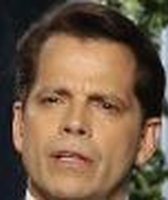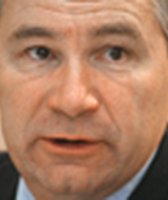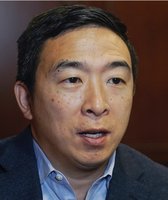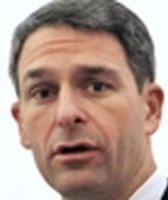Stand up for the facts!
Our only agenda is to publish the truth so you can be an informed participant in democracy.
We need your help.
I would like to contribute
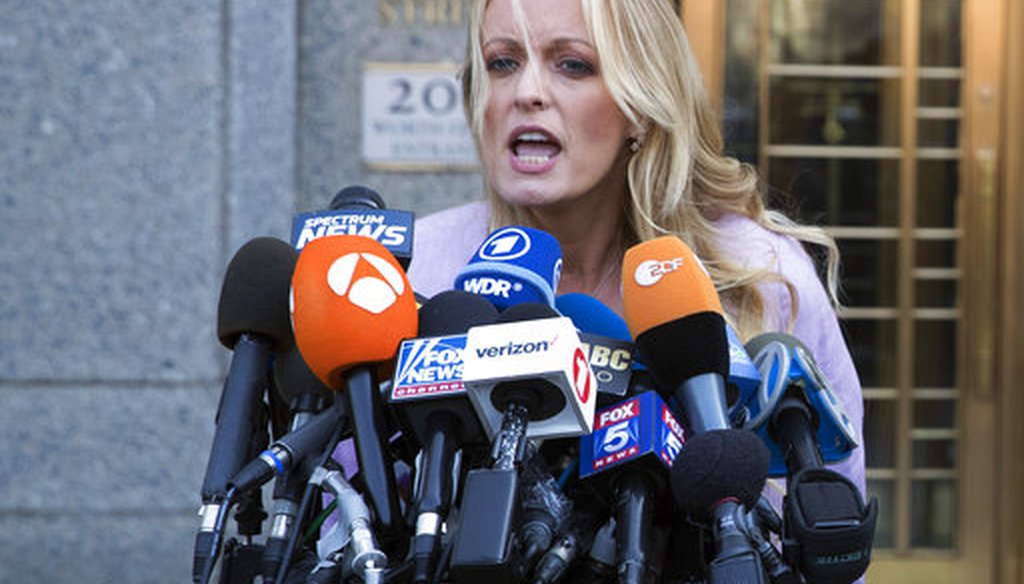
Adult film actress Stormy Daniels speaks outside federal court, Monday, April 16, 2018, in New York. (AP Photo/Mary Altaffer)
President Donald Trump and his team have repeatedly denied that Trump had a relationship with adult film actress Stormy Daniels, and have left unclear Trump’s role in furnishing hush money to silence the porn star about their alleged 2006 affair.
But the conviction of Trump’s longtime lawyer and fixer, Michael Cohen, for violating campaign finance laws place Trump squarely at the center of the repayment scheme.
Cohen and his lawyer indicated that Trump had directed him to pay hush money in the run-up to the 2016 election in exchange for two women’s silence about alleged affairs. The women are believed to be Daniels, whose real name is Stephanie Clifford, and former Playboy model Karen McDougal. Both claim to have had a sexual relationship with Trump in the mid 2000s while he was married to wife Melania.
Court filings described Cohen, acting on behalf of Trump, arranging to purchase exclusive rights to the women’s stories of Trump’s alleged infidelities, for the purpose of preventing their publication, a tactic known as "catch-and-kill." Cohen’s lawyer, Lanny Davis, said this was done "for the principal purpose of influencing an election."
Cohen’s sworn testimony before a federal judge in New York Aug. 21 added a new layer to the Trump team’s series of explanations about Trump’s role in financing hush money payments ahead of the election.
Sign up for PolitiFact texts
Here’s a timeline of the shifting account:
Hicks told the Wall Street Journal it was "absolutely, unequivocally" false that Trump and Daniels had had a relationship.
The Wall Street Journal revealed that Cohen arranged for Daniels to receive $130,000 in exchange for her silence.
That same day, Cohen issued a statement on Trump’s behalf denying the affair. The statement did not address the payment, however.
"President Trump once again vehemently denies any such occurrence as has Ms. Daniels. This is now the second time that you are raising outlandish allegations against my client," Cohen told the Journal. "You have attempted to perpetuate this false narrative for over a year; a narrative that has been consistently denied by all parties since at least 2011."
Separately, Cohen provided a statement — ostensibly from Daniels — denying the affair. Here’s how it appeared in the Journal:
"Mr. Cohen also sent a two-paragraph statement by email addressed "TO WHOM IT MAY CONCERN" and signed by "Stormy Daniels" denying that she had a "sexual and/or romantic affair" with Mr. Trump.
"Rumors that I have received hush money from Donald Trump are completely false," the statement said.
Daniels has also contradicted herself about whether an affair occurred. However, she has recanted statements she’d made denying the affair, claiming she only signed a denial because Cohen "made it sound like I had no choice."
Deputy press secretary Raj Shah told reporters aboard Air Force One that questions about the affair and the settlement agreement had been "asked and answered" during the campaign even though reports of the hush money deal did not emerge until more than a year after the election.
Cohen claimed he personally paid $130,000 to Daniels, and that he received no reimbursement from the Trump Organization or Trump campaign. His did not say whether Trump personally reimbursed him.
"Neither the Trump Organization nor the Trump campaign was a party to the transaction with Ms. Clifford, and neither reimbursed me for the payment, either directly or indirectly," Cohen said in a statement to the New York Times. "The payment to Ms. Clifford was lawful, and was not a campaign contribution or a campaign expenditure by anyone."
Cohen told the New York Times he made a similar statement to the Federal Election Commission after a government watchdog filed a complaint alleging the payment was an in-kind contribution to Trump’s presidential campaign that violated campaign finance laws.
He would later say the funds were transferred from a home-equity line to an account for a personal corporation he used to facilitate the payment to Daniels.
During a press gaggle aboard Air Force One, Trump claimed he had no knowledge of the payment to Daniels. He also stated he did not know Cohen’s funding source. Here’s the exchange:
Reporter: "Mr. President, did you know about the $130,000 payment to Stormy Daniels?"
Trump: "No. No. What else?"
Reporter: "Then why did Michael Cohen make those if there was no truth to her allegations?"
Trump: "Well, you’ll have to ask Michael Cohen. Michael is my attorney. And you’ll have to ask Michael Cohen."
Reporter: "Do you know where he got the money to make that payment?"
Trump: "No, I don’t know. No."
The FBI raids Cohen’s Manhattan office, home and hotel room as part of an investigation into possible bank fraud, wire fraud and campaign finance violations. They seized business records, emails and tax documents.
In the interview with Hannity, Giuliani said that Trump had in fact repaid Cohen to silence Daniels.
Giuliani: "Having something to do with paying some Stormy Daniels woman $130,000, I mean, which is going to turn out to be perfectly legal. That money was not campaign money, sorry, I'm giving you a fact now that you don't know. It's not campaign money. No campaign finance violation. So —"
Hannity: "They funneled it through a law firm."
Giuliani: "Funneled it through a law firm, and the president repaid it."
Hannity: "I didn't know he did?"
Giuliani: "Yes."
Giuliani later suggested Trump reimbursed Cohen through installments paid to the attorney’s legal retainer.
"When I heard Cohen’s retainer of $35,000, when he was doing no work for the president, I said that’s how he’s repaying it, with a little profit and a little margin for paying taxes for Michael," Giuliani said.
In an interview with the New York Times shortly after his Hannity appearance, Giuliani elaborated on the payment plan. He said he has documents showing Trump personally repaid Cohen, which he claimed proves there was no campaign finance violation.
"Some time after the campaign is over, they set up a reimbursement, $35,000 a month, out of his personal family account," Giuliani said, adding that Trump paid Cohen some $470,000 through the payments, which included "incidental expenses."
The following day, Trump issued a series of tweets acknowledging the arrangement with Cohen and again denying the affair:
"Mr. Cohen, an attorney, received a monthly retainer, not from the campaign and having nothing to do with the campaign, from which he entered into, through reimbursement, a private contract between two parties, known as a non-disclosure agreement, or NDA. These agreements are very common among celebrities and people of wealth. In this case it is in full force and effect and will be used in Arbitration for damages against Ms. Clifford (Daniels). The agreement was used to stop the false and extortionist accusations made by her about an affair, despite already having signed a detailed letter admitting that there was no affair. Prior to its violation by Ms. Clifford and her attorney, this was a private agreement. Money from the campaign, or campaign contributions, played no roll in this transaction."
In a statement, Giuliani sought to clarify his previous remarks, saying the payments were unrelated to Trump’s candidacy:
"There is no campaign violation. The payment was made to resolve a personal and false allegation in order to protect the President's family," Giuliani said. "It would have been done in any event, whether he was a candidate or not."
In his first interview since his office was raided in April, Cohen hints that he might be willing to share information about Trump with prosecutors.
"My wife, my daughter and my son have my first loyalty and always will," Cohen said. "I put family and country first."
Lanny Davis, Cohen’s attorney, released an audiotape of Cohen and Trump apparently discussing a $150,000 payment to former Playboy model Karen McDougal. Like Daniels, McDougal claims to have had a sexual relationship with Trump in the mid 2000s. The conversation Cohen secretly recorded is said to have taken place two months before the election.
Cohen pleaded guilty in federal court to violating campaign finance laws, thereby implicating Trump. Court filings described Cohen, acting on behalf of Trump, arranging to purchase exclusive rights to the stories concerning Trump’s alleged infidelities, for the purpose of preventing their publication, a tactic known as "catch-and-kill." Cohen’s lawyer said this was done "for the principal purpose of influencing an election."
Trump tells Fox News the payments did not constitute a campaign finance violation because the payments "came from me," and "didn’t come out of the campaign."
Our Sources
Links in story.






